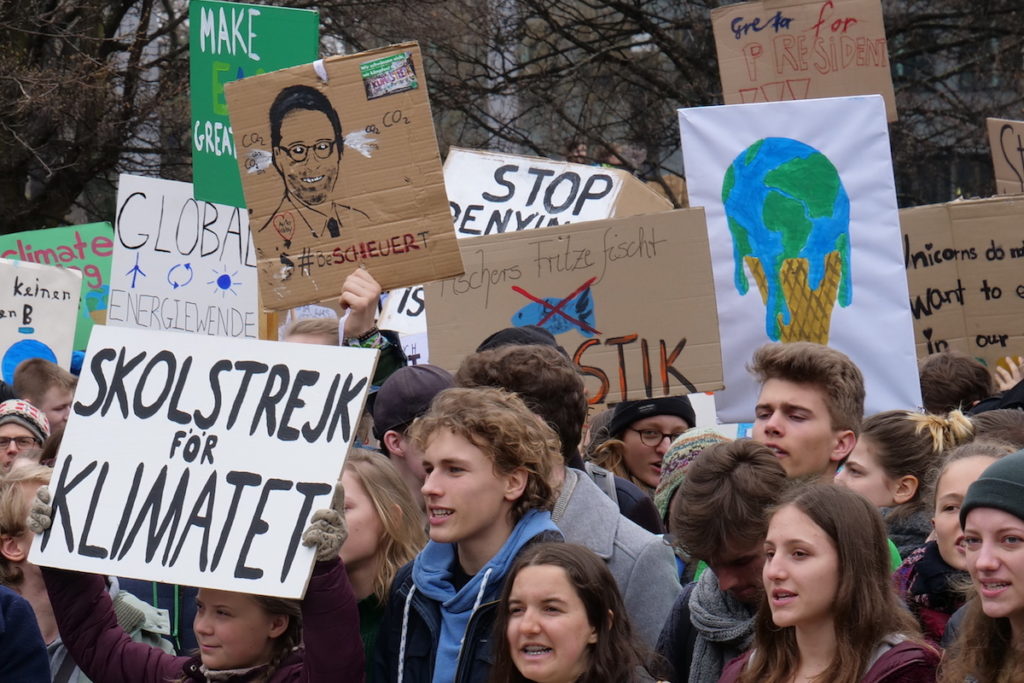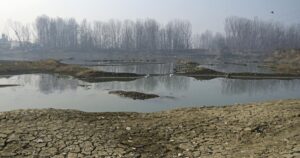Organisers of upcoming global climate strikes hope their demands for a rapid end to business as usual and a swift start to climate justice will be too loud to ignore.
The strikes, which are set for September 20th and 27th—with additional actions slated for the days in between—are planned in over 150 countries thus far, and over 6,000 people have already pledged to take part.
It has the potential to be the biggest climate mobilisation yet, said organisers.
“Our house is on fire—let’s act like it,” says the strikes’ call-to-action, referencing the words of Swedish activist Greta Thunberg. “We demand climate justice for everyone.”
Thunberg echoed that call in a just-released video promoting the upcoming actions. “Everyone should mobilise for the 20th and 27th of September,” said Thunberg, “because this is a global issue which actually affects everyone.”
It’s been the world’s youth, though, that have played a driving force in recently calling attention to the climate crisis with protests and school strikes.
“Young people have been leading here,” 350.org co-founder Bill McKibben said in the Thunberg video, “but now it’s the job of the rest of us to back them up.”
The two Fridays of action, according to organisers, will bookend a “Week for Future” to sustain the climate call. Nestled between is the United Nations Summit on Climate Change on September 23rd in New York.
“Because we don’t have a single year to lose,” said Luisa Neubauer of Fridays for Future Germany in a press statement Wednesday, “we’re going to make this week a turning point in history.”
The upcoming protests reflect a call form a diverse group of global organisations, including Amnesty International, Oxfam, La Via Campesina, Fridays for Future, and Extinction Rebellion.
The Youth Climate Strike Coalition, which includes Sunrise Movement and Zero Hour, issued a press statement Wednesday focusing on US actions on September 20th.
“The youth uprising,” said 350.org North America director Tamara Toles O’Laughlin, “is backed by millions who refuse to sit by while the Trump administration, hand-in-hand with fossil fuel executives, continues their campaign of climate denial and policy rollbacks, all while we face extreme heat waves, hurricanes, floods, and wildfires.”
“We stand with communities demanding economic transformation that works for our collective right to a sustainable, healthy, and livable future,” she continued.
Backing up the need for the mobilisation is ample evidence of the climate crisis. As the Global Climate Strike website sums up:
Our house is on fire.
Our hotter planet is already hurting millions of people.
We need to act right now to stop burning fossil fuels and ensure a rapid energy revolution with equity, reparations, and climate justice at its heart.
The inter-generational and global actions, according to the global organisers, can serve to show the size of chorus of those demanding and en to the fossil fuel economy, bring out those previous on the sidelines of the climate justice fight, and “kickstart a huge wave of action and renewed ambition all over the world.”
To make that happen, massive turnout is necessary, said Evan Cholerton of Earth Strike International. “Multinational corporations aren’t going to give up anything unless we fight,” he said.
“This is a fight for ourselves, for our future, and for future generations,” continued Cholerton. “This is a fight for justice for all: workers, students, parents, teachers, conservatives, liberals, socialists, and everyone else. We can fight against climate breakdown, and we can fight against environmental destruction. We need to all be part of this, or else the establishment won’t budge.”
“We can do this,” he added, “if we do this together.”
(Andrea Germanos is senior editor at Common Dreams, a non-profit media centre in the United States.)
Editor’s note: Meanwhile, the climate crisis keeps getting worse, as the following article eloquently brings out:
Greenland Ice Sheet Faces Possible Record-Breaking Melting
(by Eoin Higgins)
Last week’s European heatwave is moving north toward the Arctic, where temperatures could trigger record melting in Greenland and affect sea levels worldwide for millennia.
That’s according to meteorologist Eric Holthaus, who said on Twitter on July 29, 2019 that the melting event from the heat could result in the loss of 40 billion tons of ice. “This single heat wave will create a permanent change in our oceans that will linger for millennia,” said Holthaus. “We are in a climate emergency.”
The heat is an indicator of the climate crisis that can’t be ignored, US Congresswoman Alexandria Ocasio-Cortez (D-N.Y.) tweeted. She said the crisis makes the case that her Green New Deal legislation needs to be passed as soon as possible, no matter the concerns about it being “too much, too soon.”
“Setting climate goals for 2030 isn’t due to some arbitrary political rationale—it’s there due to scientific consensus,” said Ocasio-Cortez. “Simply put, we must draw down carbon by 2030 to stave off climate disaster on levels yet unseen.”
The current spate of Arctic melting may break the record for the region set in 2012. As BuzzFeed News reported on July 26, Arctic ice is disappearing at a rate higher than ever recorded—and in 2012, the rate was exacerbated by storms that broke up sea ice in the summer leading to more melting.
This time, it’s heat.
On Monday, CNN talked to Ruth Mottram, a climate scientist with the the Danish Meteorological Institute, who said the 2019 melt is particularly dangerous. This year’s melt is different to the one in 2012 as it is happening persistently every day rather than in extreme bursts, Mottram noted. She said that Greenland’s ice loss has added an estimated 180 gigatons (billion tons) of water to the oceans since the 1 July. This contributes to a global sea level rise of around half a millimeter.
On Tuesday, Democracy Now! host Amy Goodman laid out the risk to the planet if the Greenland ice sheet melts and noted the connection of climate change to the rapidly disappearing glaciers on the island. “If the ice sheet melts entirely, it would raise global sea levels by almost 23 feet,” said Goodman. “Last month was the hottest June ever recorded on Earth, while July is on track to be the hottest month ever.”
(Eoin Higgins is senior editor at Common Dreams.)




